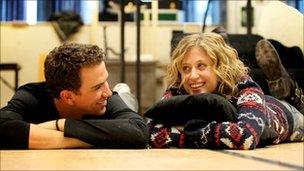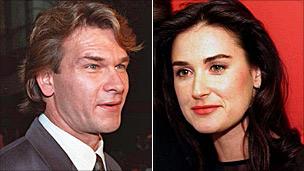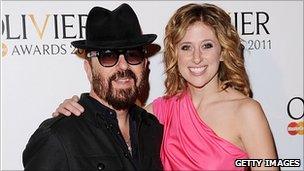Ghost jumps from screen to stage
- Published

Richard Fleeshman and Caissie Levy play Sam and Molly in Ghost The Musical
Ghost, the tragic love story starring Patrick Swayze and Demi Moore, tugged at a million tear ducts when it appeared on the big screen 21 years ago.
Now it has become the latest cinema hit to be recreated on stage. But can it recapture the magic?
It is one of Hollywood's classic weepies - a young couple are in the full flush of love and start a life together, with a raunchy pottery-making session along the way.
Then he is killed, becomes a ghost and has to find a way to communicate with his beloved from the other side.
With $500m in box office takings and five Oscar nominations, the supernatural romance was one of the most popular films of the 1990s.
The stage version of Sam and Molly's story received its world premiere in Manchester on Monday, where it will be seen before transferring to London's West End in June.
Bruce Joel Rubin has adapted his script for the theatre, while Eurythmics star Dave Stewart has co-written the songs.

Patrick Swayze and Demi Moore: a hard act to follow
Stewart admits he was "a bit put off" by the glossy Hollywood production when the film came out. But he has since been won over by the story's emotional strength.
"I've seen it a few times and every time I see it, everybody cries. Everybody," the musician says. "I haven't seen one person not cry when they've seen it. Well, we make that 10 times worse on the stage."
Stewart says Ghost is well suited to be made into a musical. "When you take a couple who are in love and have all these aspirations and then within the first 15 minutes the main character is shot down and dies in the arms of his lover, it's already a huge tragedy and drama," he says.
"And then his quest to be able to tell her that he loved her and he's trapped in this in-between world - it just lent itself really well to it."
Fans will be reassured to know the plot is largely the same. Former Coronation Street actor Richard Fleeshman fills Swayze's role as Sam, while Canadian actress Caissie Levy is Molly.
In preparation, both have had lessons from professional potters. And the ghostly trickery - such as walking through closed doors - is recreated with illusions.

Dave Stewart accompanied Caissie Levy to the recent Laurence Olivier Awards
"As long as you stick true to the story and don't mess with the identities and the characters and you strengthen them through musicality, I don't think you can really screw it up," Stewart says confidently.
Rubin, who won an Oscar for best screenplay for the original, took some persuading before he agreed to let his film be turned into a stage show.
"People have approached me about it any number of times and my instinct every single time was to say no," he reveals.
"For me, it would be taking an iconic movie and turning it into something where people sing these inept lyrics that were not anything I had engineered or created, and I didn't want to hand it over to somebody else."
But during a long visit from a persistent producer to his home in upstate New York, Rubin relented when he realised that music could add an extra dimension to the story.
"There's a whole world of emotion that is unspoken in the film, that is deeply felt," he explains.
"Yes, you can feel it in the movie. But to give it voice you must really allow this person to sing their heart out. It's so natural that they would. It comes so easily. It belongs there."
Adapting films for the stage is far from a novelty. The Lion King and Billy Elliot are among those that have hit a winning formula, while a long list of others - from Dirty Dancing and Legally Blonde to Shrek and The Wedding Singer - have entertained fans. But many more have struggled to make the leap.
Stewart raises the spectre of Spider-Man, which has had a tortured transition to Broadway. "Obviously action films are pretty difficult to make musicals out of, even though people are attempting to do that," he says.
The songwriter is speaking from experience - in 2004 he staged a version of Jane Fonda's 1968 fantasy Barbarella in Vienna.
"It was very hard," he says. "You try being English and writing something comedic in German, it's not the easiest thing in the world, so I was tossed in the deep end."
Rubin, meanwhile, used Billy Elliot as a template when translating Ghost for the stage, and cites Hairspray and Wicked as examples of shows that did not work so well.
"Not everything needs to be sung," he says. "Most musicals that I've seen recently don't work for me. They don't seem to require the music. There is music, but why bother?
"But when somebody can't speak the words, or the emotion is so profound that words don't do it justice, song and melody become the only way to get it out."
Ghost opens at Manchester Opera House before moving to the Piccadilly Theatre in London on 22 June.
- Published12 November 2010
- Published24 November 2010